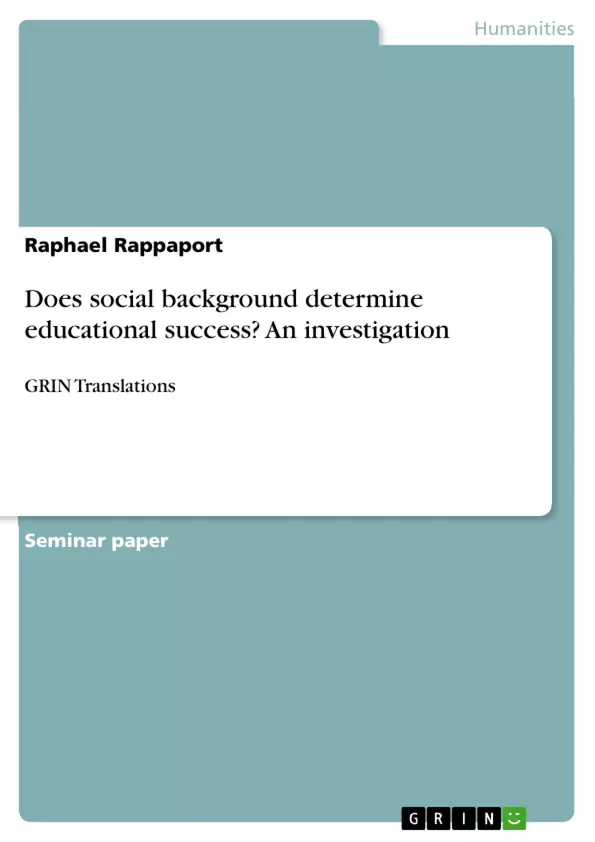This text was translated with the help of AI and reviewed by the GRIN editorial team.
The aim of this term paper is to find a satisfactory answer to the question: "Does social background determine educational success?". It also aims to collate and clarify reasons, theories and proposed solutions. Beginning with a definition of the term in order to clarify and familiarise the reader with the question, the third chapter of the paper deals with the factors required for educational success.
This is followed by an answer to the question whether educational disadvantage due to social background even exists in Germany and what consequences it has. This is followed by an explanation as to why the situation in the German education system is the way it is. To better explain this question, some theories are used to help. Finally, possible solutions are illustrated and explained. The final chapter contains a discussion section with the answer that social background definitely determines educational success, the findings of this term paper and my personal opinion on the subject.
The PISA study of 2002 reignited the discussion about equity in the German school system and continues to this day. Social work is also affected by this topic, as its ultimate goal is social justice, the promotion of social development and the empowerment or liberation of people.
Inhaltsverzeichnis (Table of Contents)
- Abstract
- Introduction
- Definitions of terms
- Social origin
- Educational success
- Factors for educational success
- Educational level of the family of origin
- Income
- Migration background
- Segregation
- Family structures
- Is there an educational disadvantage due to social background in Germany?
- Consequences of educational inequality
- Explanatory approach
- The resource investment approach
- Raymond Boudon's Theory of Rational Decision
- Pierre Bourdieu's theory of social reproduction
- Coleman's theory of human capital
- Perspectives for action to reduce educational inequalities
- Discussion part: Does social background determine educational success?
Zielsetzung und Themenschwerpunkte (Objectives and Key Themes)
This term paper aims to answer the question of whether social origin can determine educational success in Germany. It does so by examining various factors influencing educational success, analyzing existing theories on educational inequality, and reflecting critically on the situation within the German education system.
- The impact of social origin on educational success
- Factors influencing educational achievement, including family background, income, and migration background
- Theories explaining educational inequality, such as the resource investment approach, Bourdieu's theory of social reproduction, and Coleman's theory of human capital
- The role of social work in promoting social justice and educational equality
- Possible solutions to reduce educational inequalities
Zusammenfassung der Kapitel (Chapter Summaries)
- Abstract: This section introduces the research question and outlines the study's objectives, methodology, and structure.
- Introduction: This chapter provides a broad overview of the issue of educational inequality in Germany, highlighting its relevance in the context of social work, refugee crises, and integration debates. It also outlines the structure of the paper.
- Definitions of terms: This chapter defines the key concepts of "social origin" and "educational success," emphasizing the role of socio-cultural influences on an individual's upbringing and the various indicators of educational achievement.
- Factors for educational success: This chapter explores various factors that contribute to educational success or failure, including the educational level of the family of origin, income, migration background, segregation, and family structures.
- Is there an educational disadvantage due to social background in Germany?: This chapter examines the presence of educational disadvantages based on social origin in Germany, drawing upon relevant research and statistics.
- Consequences of educational inequality: This chapter explores the various consequences of educational inequality, highlighting its societal and economic impacts.
- Explanatory approach: This chapter presents different theoretical frameworks for understanding educational inequality, including the resource investment approach, Raymond Boudon's Theory of Rational Decision, Pierre Bourdieu's theory of social reproduction, and Coleman's theory of human capital.
- Perspectives for action to reduce educational inequalities: This chapter explores potential strategies and policies aimed at mitigating educational inequalities and promoting equitable access to education.
Schlüsselwörter (Keywords)
This term paper explores the multifaceted issue of educational inequality in Germany, drawing on relevant research and theories. Key themes include social origin, educational success, factors influencing achievement, theories of social reproduction, resource investment, and strategies for reducing inequality. The paper examines the role of social work in promoting social justice and fostering inclusive education.
- Arbeit zitieren
- Raphael Rappaport (Autor:in), 2016, Does social background determine educational success? An investigation, München, GRIN Verlag, https://www.hausarbeiten.de/document/1466912


